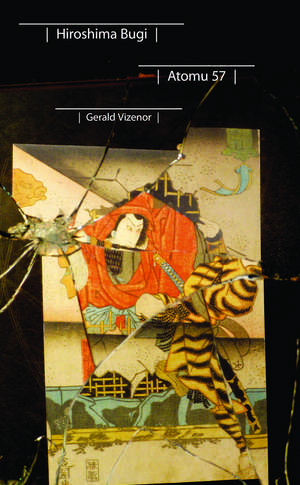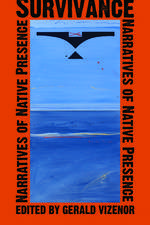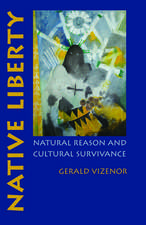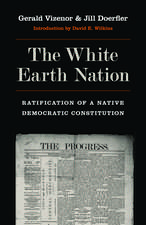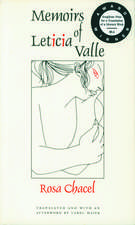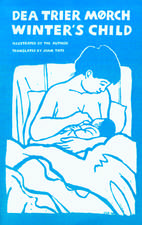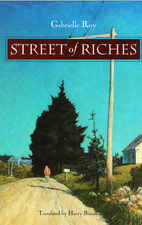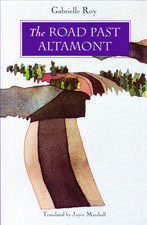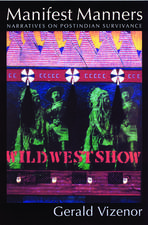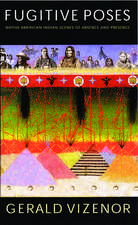Hiroshima Bugi: Atomu 57: Native Storiers: A Series of American Narratives
Autor Prof. Gerald Vizenoren Limba Engleză Paperback – 31 dec 2009
Hiroshima Bugi is an ingenious kabuki novel that begins in the ruins of the Atomic Bomb Dome, a new Rashomon Gate. Ronin Browne, the humane peace contender, is the hafu orphan son of Okichi, a Japanese boogie-woogie dancer, and Nightbreaker, an Anishinaabe from the White Earth Reservation who served as an interpreter for General Douglas MacArthur during the first year of the American occupation in Japan.
Ronin draws on samurai and native traditions to confront the moral burdens and passive notions of nuclear peace celebrated at the Peace Memorial Museum in Hiroshima. He creates a new calendar that starts with the first use of atomic weapons, Atomu One. Ronin accosts the spirits of the war dead at Yasukuni Jinga. He then marches into the national shrine and shouts to Tojo Hideki and other war criminals to come out and face the spirits of thousands of devoted children who were sacrificed at Hiroshima.
In Hiroshima Bugi: Atomu 57 acclaimed Anishinaabe writer Gerald Vizenor has created a dynamic meditation on nuclear devastation and our inability to grasp fully its presence or its legacy
Preț: 144.94 lei
Nou
Puncte Express: 217
Preț estimativ în valută:
27.74€ • 28.85$ • 22.90£
27.74€ • 28.85$ • 22.90£
Carte tipărită la comandă
Livrare economică 14-28 aprilie
Preluare comenzi: 021 569.72.76
Specificații
ISBN-13: 9780803232846
ISBN-10: 0803232845
Pagini: 224
Dimensiuni: 139 x 215 x 17 mm
Greutate: 0.29 kg
Editura: Nebraska Paperback
Colecția University of Nebraska Press
Seria Native Storiers: A Series of American Narratives
Locul publicării:United States
ISBN-10: 0803232845
Pagini: 224
Dimensiuni: 139 x 215 x 17 mm
Greutate: 0.29 kg
Editura: Nebraska Paperback
Colecția University of Nebraska Press
Seria Native Storiers: A Series of American Narratives
Locul publicării:United States
Notă biografică
Gerald Vizenor is a professor of American Studies at the University of California, Berkeley. He is the author of more than twenty books, including the American Book Award winner Griever: An American Monkey King in China and Wordarrows: Native States of Literary Sovereignty (Nebraska 2003).
Recenzii
“Vizenor is at full speed in Hiroshima Bugi. This book is a natural dance of concepts. Vizenor does for Native literature what James Joyce does for Irish literature in Ulysses and Finnegans Wake."—Diane Glancy, author of Designs of the Night Sky
"Vizenor has a reputation for taking chances with his novels, for pushing the form in new directions. He outdoes himself in his latest. . . . Readers who have shared other adventures with Vizenor will not be disappointed."—Library Journal
“Gerald Vizenor contributes to Nebraska’s Native Storiers series a novel that challenges conventional notions of ethnic, cultural, and stylistic purity. . . . In this requiem for the atomic age’s forgotten victims, Vizenor offers us another sophisticated, alternately sensitive and ironic meditation on the importance of cross-fertilization and remembrance.”—Thomas Hove, Review of Contemporary Fiction
“Hiroshima Bugi is a very effective examination of atomic destruction, and how the generations afterwards have dealt with it. It is also a penetrating examination of Japanese culture, tying together in rather remarkable fashion traditional and outside influences: from kabuki to tattooing to the film, Hiroshima mon Amour, Vizenor utilizes the familiar (and explains what is not) and creates a work that is truly insightful.”—The Complete Review
"Hiroshima Bugi is a dance that exposes the vacillation necessary for the preservation of the vital lies of war and capitalism. Its central rhythm is a reminder of our obligation to live lives of peace and reconciliation, burdens that humanity seems to find impossible. At the novel's best it reminds us of Kurt Vonnegut's dark but life-affirming Cat's Cradle and Slaughterhouse Five."—Dex Westrum, Milwaukee Journal Sentinel
"Mapping the realms that matter to transformations of consciousness is one order of business; evoking transformative visionary presence is another. Transpersonal explorations of issues of identity and peace require not just orientation but also evocation. There is no better introduction to these issues than the challenges that Gerald Vizenor's latest fiction, Hiroshima Bugi, poses to transpersonal thinking."—
Jurgen W. Kremer, ReVision
